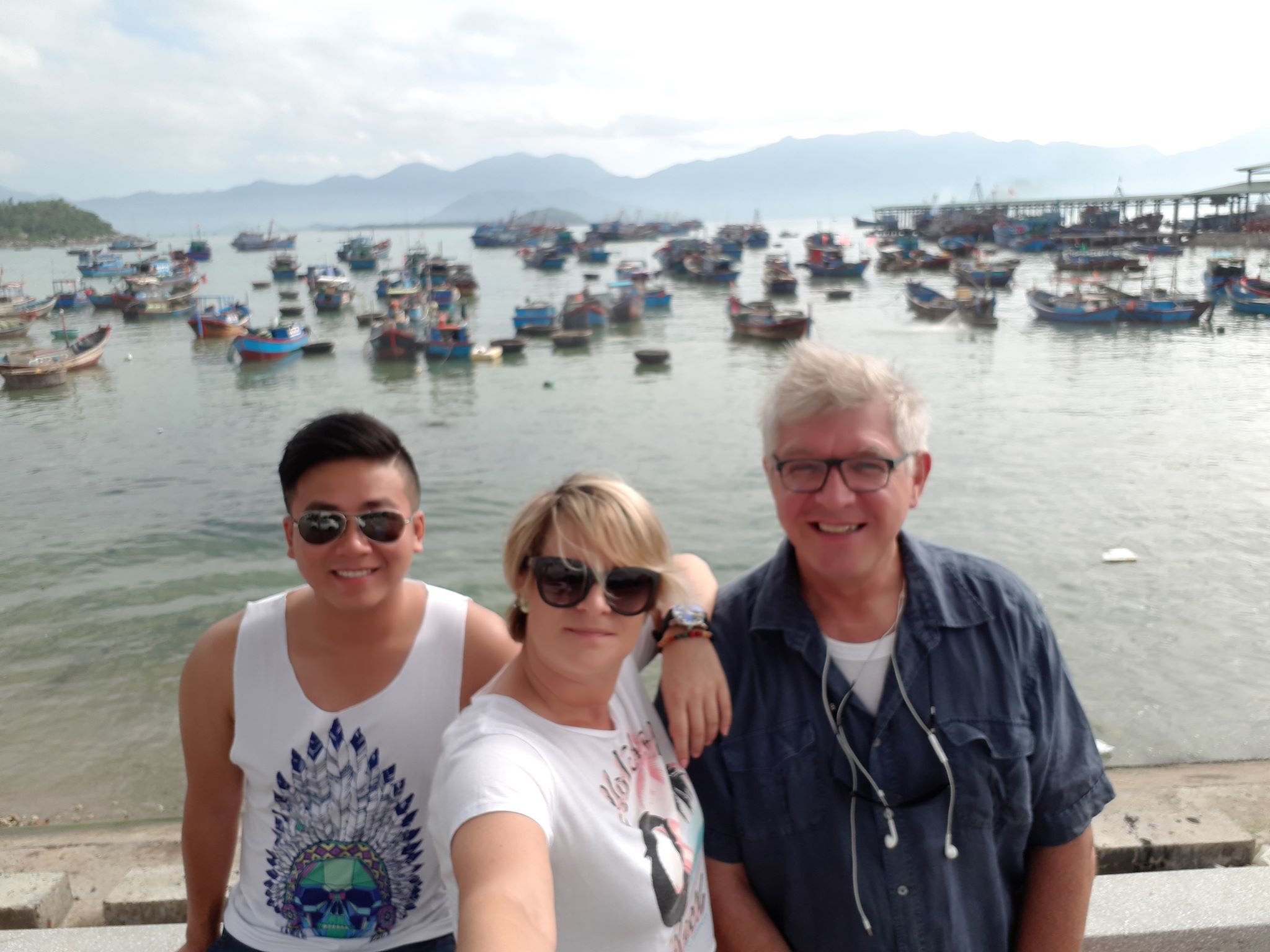Croatian Companies Who Lay Off Staff Can Access Government Support
The Croatian Employers' Association's request is set to be granted by the Croatian Government early next week, and now even Croatian companies who have been forced to lay off staff during the ongoing and unprecedented coronavirus crisis will be allowed to access support from the government.
As Novac writes on the 5th of April, 2020, the Croatian Employers' Association (HUP) welcomes the announcement from the Ministry of Labour that at the CES Governing Council session on Monday, their request for all Croatian companies who were forced to lay off workers and/or close their companies to be able to access support will be granted.
The ability to seek financial support from the various economic measures recently presened by the government will be given to all Croatian companies who were forced to lay off workers and close down their operations before the entry into force of the measures passed by the Government of the Republic of Croatia in the face of the coronavirus crisis.
Last week, the Croatian Employers' Association addressed three ministries requesting that the second package of government measures, in the part related to job support grants, be made available to all small and micro enterprises who laid off workers because they didn't see any prospect for that in the first package of announced measures. Small and micro-enterprises, as the HUP has repeatedly emphasised, should then have been required to write off all payments, as mere delays were not sufficient to preserve jobs.
''As soon as the second package of measures was announced, the HUP requested understanding from the Croatian Government towards all micro and small enterprises, which were forced to lay off their workers due to discontinued operations or great difficulties. We're pleased that this move means returning workers to their jobs, restarting businesses and believing that this crisis can be overcome more quickly. This crisis teaches us how important it is to preserve our own production, develop and invest in our own knowledge and our own resources,'' stated Davor Majetić, CEO of the Croatian Employers' Association.
More detailed information on the use of government grants is expected early in the coming week following the end of the aforementioned session due to take place on Monday.
Follow our dedicated section for more on coronavirus in Croatia.
Corona Voices in the Croatian Diaspora: Emanuela in Vietnam
April 5, 2020 - With as many Croatians living abroad as in the Homeland, what are the diaspora experiences of self-isolation? In the first of a new series, Corona Voices in the Croatian Diaspora, Emanuela Peric on the current realities in Vietnam.
Last week TCN started a feature series called Foreigner Self-Isolation In Croatia: Do You Feel Safer? I can honestly say we have never had such a response or so many incredible contributions. The countries of origin of these expats in Croatia literally from all over the world. So far we have had submissions from expats from Romania, USA, Ireland, UK, Mexico, Argentina, Spain, Singapore, Holland, Canada, India, Hong Kong, Venezuela, Latvia, China, Honduras, Hungary, Moldova and Germany. You can see all their stories here.
Given the success of the series (still going strong) and large interest, it made sense to expand it to look at this from another angle - how Croatians abroad are coping where they are. If you would like to contribute your story to Corona Voices in the Croatian Diaspora, please find the submission guidelines below.
I contacted some of my favourite people in the diaspora to get the series started. And what better way to start than on an idyllic beach in Vietnam, with one of the craziest Croats I know - Emanuela Peric from the island of Rab.
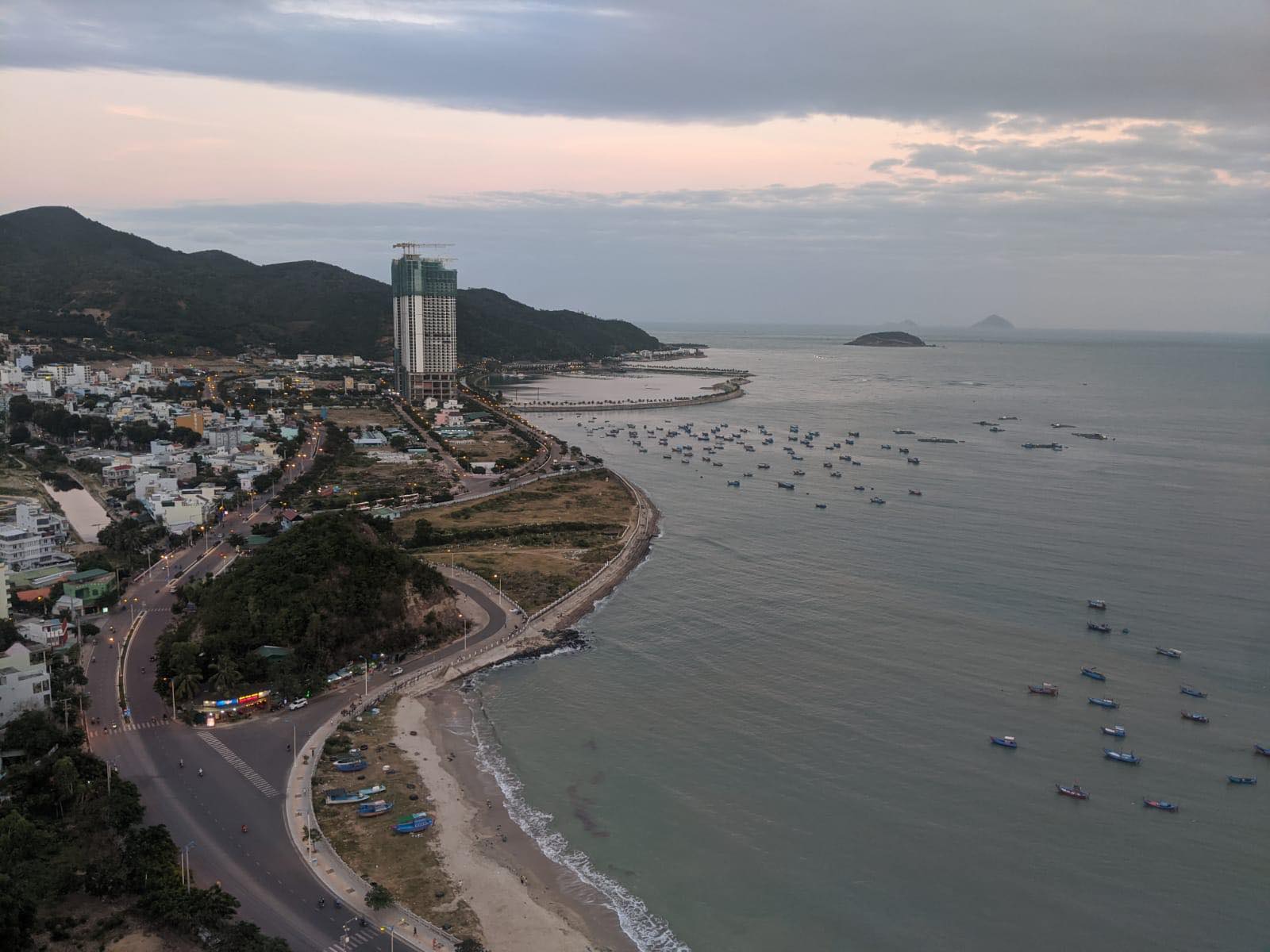
Firstly, how are you? Are you alone/with someone? Tell us a little about your situation and sanity levels.
Xin Ciao from Nha Trang, a coastal city on the South Central Coast of Vietnam. I am currently living in a beautiful villa with four others. I am using the word “villa” here as a reminder to myself not to complain!
My roommates are my colleagues and my boss who always finds ways to keep me busy. Some I have known for years now and that gives me a “safe” feeling – it really helps with the sanity part.
Our project has been currently suspended, as have many others, and we are now focused on what to do in lockdown and we can’t (and really don’t want to) go home (Croatia, Germany, Philippines nationalities in this little self-isolation unit).
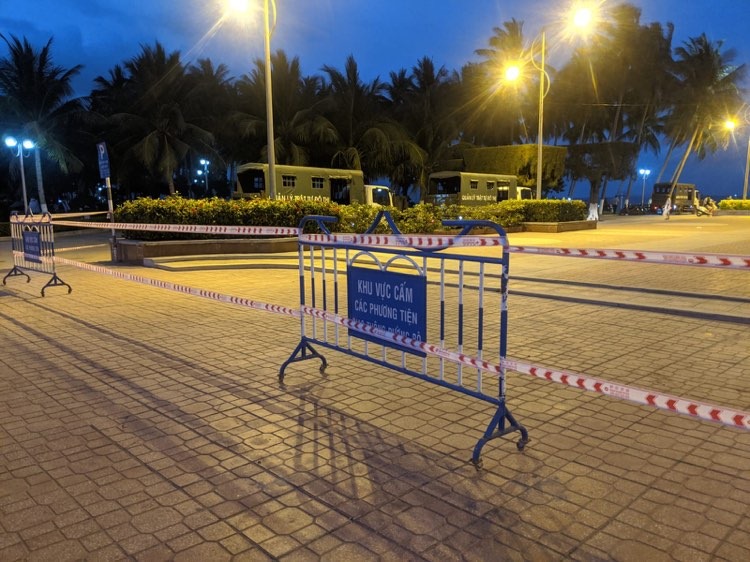
When did you realize that corona was going to be a big issue?
After spending a few months in Europe, I came back to Vietnam on 6th of February just when it was all starting, and at that time I was sure China would contain it and the worst-case scenario would be sightseeing without Chinese guests (that didn’t sound so bad to me). But then Italy happened and each morning I woke up to a different situation in Europe, realizing more and more what’s happening and getting used to words like self-isolation, quarantine, lockdown, curfew …
I’m strolling down this beautiful beach and all of a sudden it’s like a bad movie – pandemic, deaths in Italy and then an earthquake in Zagreb!
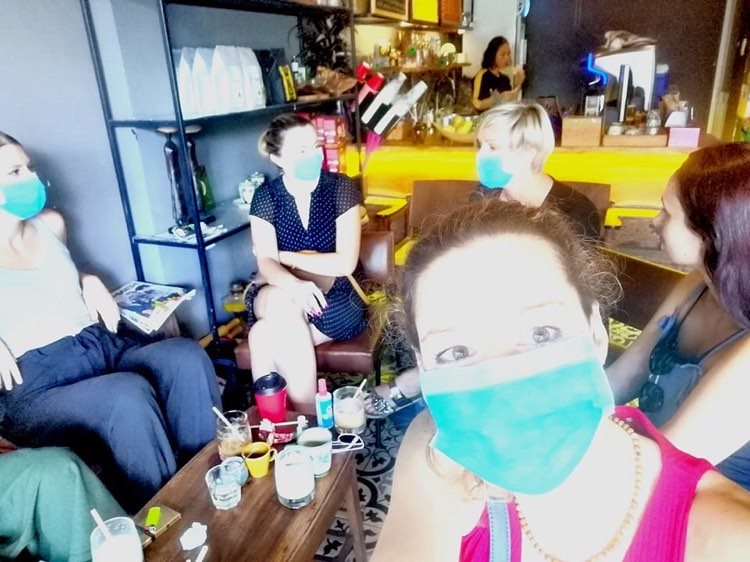
When did you realize that corona was going to be a big issue in Nha Trang in particular?
Nha Trang and the entire Khánh Hòa Province (officially) had only one case from February 2. Life was in a way normal here until April 1 when the national lockdown started.
There were no guests, hotels and restaurants were closing down, which mostly focused on the Chinese market which is the majority in my city. We still spend days on the beach, going for dinner, drinks. It was like wintertime in Croatia only no winter and we can afford to eat and drink outside.
Give us a timeline on when and how life changed.
The Vietnamese government closed the borders with infected countries, one by one and we had only 25 cases. Then and now I still believe this is one of the safest places on Earth, from COVID-19.
At the begging of March, locals who were traveling in Europe started coming back home and bringing unwanted souvenirs. Again something from the West bothering Vietnam. With a low number of cases they announced a nationwide lockdown for the entire month of April, not taking any risks. Meaning no gathering, beaches are closed, food stores still work and food delivery.
People started washing their hands and respecting personal space – not complaining about that!
Life was cheap here, and now it's even cheaper. Prices are going down like crazy, but of course so is the unemployment rate.
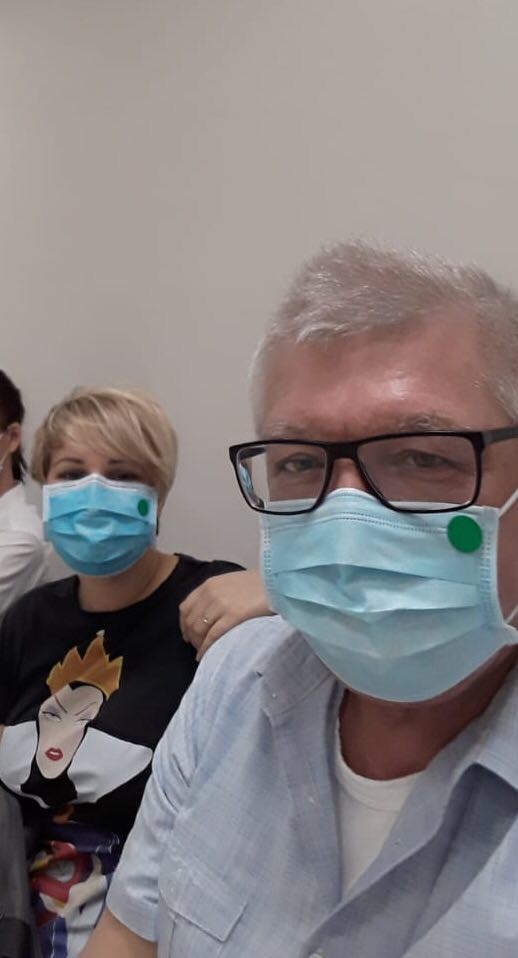
Tell us about your day. Do you/can you leave your apartment?
Hello, it’s a villa! And yes, I can go out, have a walk, do some jogging, go to a local store.
I’m trying to maintain a routine, treat working days as that and weekends for drinking, and sleeping longer.
With the internet there are so many things to keep you busy and there are also house chores. Then you have Netflix. It’s time to learn yoga and finish that Russian course. All those books I got for my Kindle will have their turn. Finally I have time to edit all those GoPro videos, and I’m learning how to play chess.
I have been promoted to Executive Laundry Manager of our little house. One bin for white, one for black and one for color!.
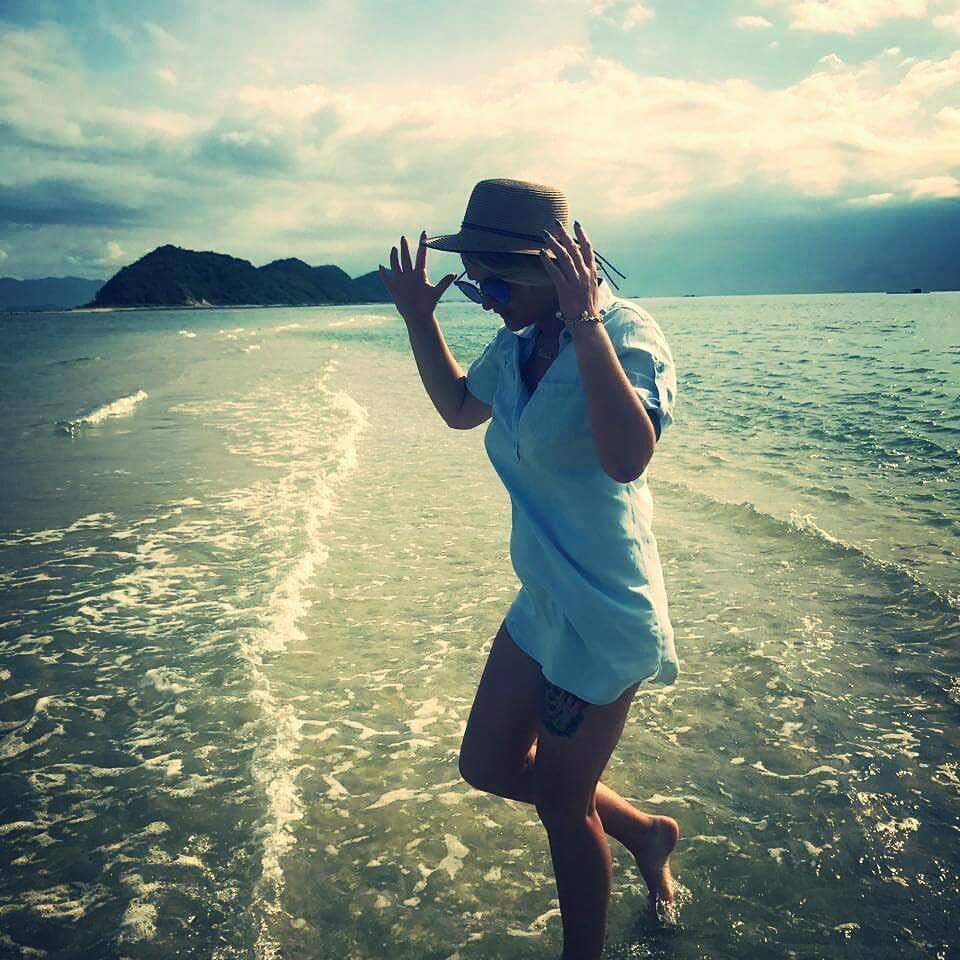
How are the authorities doing at handling the situation?
This is a Communist state – I think that speaks for itself... There is no joking around and they don’t say something twice, particularly if you are a foreigner. I’m not playing western music too loud lately...
All jokes aside, Vietnam is doing well controlling the COVID-19 pandemic. There are 239 confirmed cases as I’m writing this, in a country of 96 million.
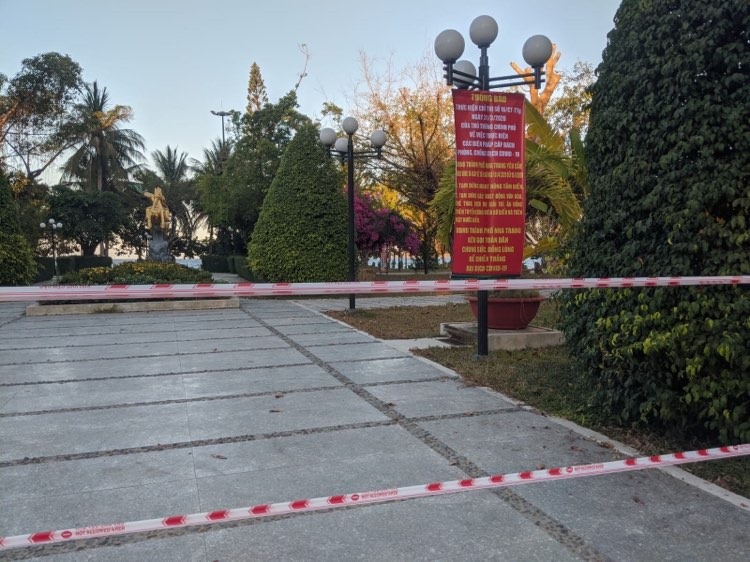
You obviously keep an eye on your homeland. What is your impression of the way Croatia is dealing with the crisis?
What should I say about this that will not make my blood pressure jump?
COVID–19 is not the problem, UHLJEBI are the problem. We got the middle finger from our embassy in Malaysia while other countries are localizing their citizens around the world, evacuating them, making them feel like there is someone thinking of them.
The crisis is yet to come, hopefully a big change too.
Compare and contrast the responses of Croatia and Vietnam. Who is doing what better?
Difficult to compare, it’s easier to close borders here and I’m not fully familiar with all the economic measures Vietnam is doing to help the locals but I’m sure there is a lot less paperwork involved.
The good thing for both countries is that they reacted quickly, but the Croatians still seem a bit unaware that they need to stay inside.
What about official communications from the authorities, compared to your home country?
Expat community here has clear information and the locals as well. We all know what we can and cannot do. We get SMS daily with reminders to stay at home and to wash our hands. As back home, there is a van with speaker driving around and reminding people to go home. Police is everywhere, making sure you don’t brake social distancing rules.
If there is a difference to mention then is that of Face Masks, Vietnamese and most South East Asians wore them religiously before so of course more so now.
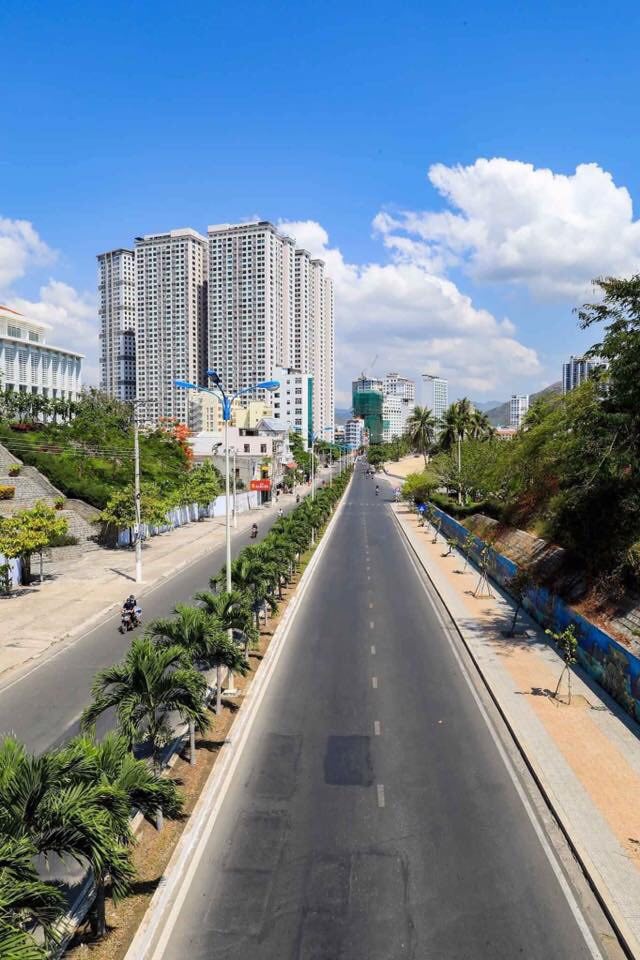
What's the one thing you wish you had taken with you into self-isolation?
Hahaha.. I would have gotten myself a boyfriend, weed and more alcohol!
One thing you have learned about yourself, and one thing you have learned about others during this crisis.
I do panic sometimes and I too get scared.
Those who didn’t have time for a video call before COVID-19 don’t have time now as well.
And I’m super interested in what is going to happen to our Uhljeb’s!
If you could be self-isolating in Croatia, where would it be, and why?
You mean spend another winter on a Croatian island ??
I don’t want to be in Croatia, isolation or not! Unless we are throwing Molotov cocktails at St. Mark’s Square!
Thanks Emanuela, nice to see some places are safe and life still almost a little normal. Stay safe and maybe I will join you on St. Mark's Square when the time is right...
TCN is starting a new feature series on Croatian diaspora experiences of sitting out COVID-19 abroad and comparing your experiences to the situation in Croatia. If you would like to contribute, the questions are below. Please also include a para about yourself and where you are from, and a link to your website if you would like. Please also send 3-4 photos minimum to This email address is being protected from spambots. You need JavaScript enabled to view it. Subject Corona Diaspora
If you would be interested to record a video version for our partners www.rplus.video please let us know in the email. Thanks and stay safe.
Self-Isolation Voices from the Diaspora
Firstly, how are you? Are you alone/with someone? Tell us a little about your situation and sanity levels.
When did you realise that corona was going to be a big issue?
When did you realise that corona was going to be a big issue in New York in particular?
Give us a timeline on when and how life changed.
Tell us about your day. Do you/can you leave your apartment?
How are the authorities doing at handling the situation?
You obviously keep an eye on your homeland. What is your impression of the way Croatia is dealing with the crisis?
Compare and contrast the responses of Croatia and USA. Who is doing what better?
What about official communications from the authorities, compared to your home country?
What's the one thing you wish you had taken with you into self-isolation?
One thing you have learned about yourself, and one thing you have learned about others during this crisis.
If you could be self-isolating in Croatia, where would it be, and why?
TCN has recently become a partner in Robert Tomic Zuber's new R+ video channel, initially telling stories about corona experiences. You can see the first TCN contribution from this morning, my video from Jelsa talking about the realities of running a news portal in the corona era below. If you would like to also submit a video interview, please find Robert's guidelines below
VIDEO RECORDING GUIDE
The video footage should be recorded so that the cell phone is turned horizontally (landscape mode).
There are several rules for television and video news:- length is not a virtue- a picture speaks more than a thousand words
In short, this would mean that your story should not last more than 90 seconds and that everything you say in the report should be shown by video (for example, if you talk about empty streets, we should see those empty streets, etc.).
How to do it with your cell phone? First, use a selfie camera to record yourself telling your story for about a minute and a half. Ideally, it would be taken in the exterior, except in situations where you are reporting on things in the interior (quarantine, hospital, self-isolation, etc.). Also, when shooting, move freely, make sure everything is not static.
After you have recorded your report, you should capture footage that will tell your story with a picture, such as an earlier example with empty streets.
One of the basic rules of TV journalism is that the story is told in the same way as a journalist with his text. Therefore, we ask you for additional effort. Because we work in a very specific situation, sometimes you may not be able to capture footage for each sentence of the report. In this case, record the details on the streets: people walking, the main features of the city where you live, inscriptions on the windows related to the virus, etc.
The same rules apply if you are shooting a story from your apartment, self-isolation, quarantine. We also need you to capture footage that describes your story.
When shooting frames to cover your reports, it is important that you change the angle of the shot (in other words, shoot that empty street from several angles). Also, when shooting a detail, count at least five seconds before removing the camera to another detail.
The material should be about 5 minutes long (90 seconds of your report + frames to cover your story).
After recording everything, send us to Zagreb, preferably via WeTransfer to This email address is being protected from spambots. You need JavaScript enabled to view it.
Osijek Prepares Package of Economic Measures Worth HRK 18 Million
As Nikola Patkovic/Novac writes on the 3rd of April, 2020, in order to counteract the negative economic consequences of the ongoing coronavirus crisis, the City of Osijek has prepared a package of economic measures to assist Osijek's entrepreneurs who are facing business troubles because of this unprecedented and rapidly changing situation. The package is worth a massive HRK 18 million, and will be decided on by the Osijek City Council at a virtual session scheduled for Tuesday, April the 7th, 2020
''Over recent weeks, as the new situation caused by the COVID-19 pandemic has continued to unfold, all of our efforts have been focused, first and foremost, on the protection of the health of our fellow citizens, and in these efforts, the City of Osijek has partnered with both the local and the national authorities. Aware of the consequences that the crisis will have on the economy, we're giving equally important attention to the protection and preservation of every job in the City of Osijek. We don't know how long this crisis will last, but it's clear that we all have to adapt to this new situation,'' said Žana Gamoš, Osijek's Deputy Mayor, announcing the economic measures they have prepared.
Thus, they have decided that through a public call, a massive HRK 5.5 million will be directed towards small and medium-sized enterprises, as their businesses are at risk in this crisis. An entrepreneur based in Osijek who has proven that the coronavirus crisis has adversely affected his business and signed a grant agreement with the CES (Croatian Employment Service) may participate in the City of Osijek's public invitation. The city will pay the entrepreneur a one-time and non-refundable payment of HRK 1,000 per employee. The state is helping employees directly, and this Eastern Croatian city has decided to disburse funds to help with the maintainance of liquidity.
''By supplementing the Decision on communal compensation and the proposal of a Decision on the exemption from communal fee payment during these extraordinary circumstances caused by the COVID-19 virus, the City of Osijek proposes to completely exempt OPGs, craftsmen, legal entities and persons engaged in an independent activity for premises and construction land used for business purposes from needing to pay communal fees for the months of April, May and June,'' Gamoš reported.
In addition, no compulsory collection of debts will be enforced during these exceptional circumstances. The tenants of the public areas and business premises belonging to the City of Osijek have been exempted from making those payments for the month of April with the possibility of an extension depending on the duration of the unfolding situation. In addition, parents in Osijek will not have to pay for the use of kindergartens and extended stays in schools.
For more on business in Croatia, follow our page. For information on coronavirus in Croatia, follow our dedicated section.
VIDEO: SPAR Cooperating With Sixty Small Croatian Producers
With imports and exports affected by the ongoing coronavirus pandemic, the argument for self-sufficiency has never been stronger. Owing to that, Konzum announced that it would cooperate with Croatian producers who usually sell their produce on now closed markets, and allow them to continue selling those products on the popular store's shelves. SPAR, another popular store in Croatia, has done the same.
As Poslovni Dnevnik writes on the 4th of April, 2020, SPAR has so far cooperated with sixty new Croatian producers in the field of agriculture, as well as local farmers who are no longer able to sell their products on the market because of the measures put into place in Croatia to help prevent the spread of COVID-19.
''In the first few days we bought salads, packaged tomatoes, leeks, chard, parsley, spinach and more from small producers and OPGs and secured their placement on the shelves of SPAR and INTERSPAR stores.
Through the Osatina distributor, we're also buying young onions from OPG Ivan Mrašić, OPG Špiranec Mladen, OPG Rasinec Ana, OPG Vedriš Ivica and OPG Veličan Damir. In addition, some products will be sold under our brand Gardens of Croatia (Vrtovi Hrvatske), such as Balog OPG beans, OPG Vesna Bašić apples, OPG Raos-Vrgorac garlic, and cauliflower and broccoli from the company Tlzit.
With this move, we're expanding our cooperation with a large number of our existing Croatian producers. We'd like to emphasise that a large number of them are operating under the Gardens of Croatia brand. We're proud that SPAR supermarkets and INTERSPAR hypermarkets are the stores with the most Croatian products in them,'' a statement from SPAR read.
If you understand Croatia, check out the SPAR YouTube channel for more information on buying fruit and vegetables from Croatian producers:
For more on coronavirus in Croatia, as well as lengthy scientific texts from eminent Croatian scientist Igor Rudan, make sure to follow our dedicated section.
Erste Bank and Erste Card Club Donate 1.3 Million Kuna to Zagreb Hospitals
Following donations from INA and many other companies who are determined to make sure Croatian hospitals get the equipment they need, more generous donations to Zagreb hospitals have been made in the united fight against the coronavirus pandemic.
The coronavirus pandemic is wreaking havoc with the global economy, not to mention public health. In Croatia, the effects of the outbreak on the economy have been dire and the outlooks continue to look bleak, but when it comes to the health system, the measures put into place to protect lives by the Civil Protection Headquarters have been second to none.
That being said, respirators and other equipment are desperately needed for those who are suffering more seriously from coronavirus, and more and more companies are stepping up in this time of great need.
As Poslovni Dnevnik writes on the 4th of April, 2020, Erste Bank has decided to donate a generous sum to to the now very well known ''Dr. Fran Mihaljevic'' Clinic for Infectious Diseases in Zagreb in the amount of one million kuna, with the aim of assisting with the procurement of the necessary medical equipment in the current tense situation where enormous efforts are being made to curb the spread of coronavirus.
In addition, the Erste Card Club decided to donate a massive 300,000 kuna to the Children's Diseases Clinic in Klaiceva street, to help repair the material damage caused by the devastating earthquake that struck Zagreb recently, of which Zagreb hospitals were also a victim.
''The seriousness and complexity of the situation we're currently in requires a responsible reaction from all subjects in the community. In this way, we want to contribute to the efforts to overcome the challenges that lie ahead of us all, and at the same time support physicians and nurses, whose role in the current circumstances is extremely important and deserves great respect,'' said Christoph Schoefboeck, Erste CEO banks on this occasion.
Make sure to follow our dedicated section for information and updates on coronavirus in Croatia, as well as scientific texts by eminent Croatian scientist Igor Rudan.
148 Croatian Nationals Repatriated by Air from Italy, Portugal, Spain and Sweden
ZAGREB, April 5, 2020 - A total of 148 Croatian nationals were flown back to the homeland from several European countries on Saturday, the Croatian Foreign and European Affairs Ministry said in a press release on late Saturday evening.
A total of 155 passengers consisting of the 148 Croatians and a few citizens of Slovenia, Bosnia and Herzegovina, and Montenegro, arrived in Zagreb on Saturday evening aboard special Croatia Airlines flights from Portugal, Spain, Italy and Sweden where they were stuck during the outbreak of the coronavirus infection.
Upon their arrival at Franjo Tudjman Airport, the passengers were examined by infectiologists.
All those 148 citizens are required to self-isolate in the next 14 days.
On Sunday, 37 Croatian nationals will arrive by ship from Ancona to Zadar. The Croatian government said on Friday it had ensured the repatriation of Croatian nationals from Ancona by catamaran and departure from the Italian seaport is planned at 3 p.m. on Sunday.
The Jelena vessel is expected to arrive in Zadar at 6.30 p.m. that day.
Also, a group of Croatians, who are still in the Austrian region of Tyrol which is on lockdown, will be transported back to Croatia on buses.
Minister Gordan Grlić Radman said on Saturday that it was the government's obligation under the constitution to ensure repatriation of Croatian nationals.
He said on Saturday morning that a total of 893 Croatians had been repatriated since the outbreak of the coronavirus epidemic and several hundred were due to return this weekend,
More coronavirus news can be found in the Lifestyle section.
Three-Month Lockdown Will Make Croatia Borrow up to 10 Billion
ZAGREB, April 5, 2020 - The Croatian authorities will have to borrow HRK 75 billion as consequence of three months of lockdown caused by the coronavirus epidemic, and there is enough money on the market, however, it remains to be seen under what terms and conditions the money can be borrowed, the Večernji List said on Sunday.
The Finance Ministry has already taken the first six billion out of 65 billion kuna necessary for the essential functioning of the state in the next three months.
Those 65 billion include the repayment of 20 billion kuna of previous debts plus outlays for monthly wages, pension allowances, social welfare, higher costs in the healthcare system and other public services on the frontline in the fight against the coronavirus infection, the daily newspaper said.
Finance Minister Zdravko Marić said in an interview which the daily published on Saturday that those 65 billion kuna account for 45% of the projected budget for 2020.
Those are high amounts and the sources for the so-called corona credit arrangements will be first sought on the domestic market, through negotiations with banks operating in Croatia, and also the authorities are likely to tap some of the available funds held by the pension and investment funds, according to the daily.
Although 65 billion kuna already seems a huge amount, analyst Željko Lovrinčević of the Institute of Economics in Zagreb told the newspaper that an additional 10 billion kuna should be added to cover the needs of public companies and the authorities at the local level.
Lovrinčević said that Croatia could count on tapping more than a billion euros from the European Union funds in the said period.
More economic news can be found in the Business section.
A Top Tip to Make Your Post-Corona World Amazing
April 5, 2020 - Memories of past pleasures and dreams of fun in a post-corona world are two of the mental tools in our battle for sanity in this current isolated madness. A top tip to ensure a slightly more amazing future for you all.
Whatever the personal difficulties I and everyone else are currently undergoing, one thing I will say is that this is the most challenging period of my writing 'career'. There are several reasons for this.
This is a time of high stress for everyone, and I am acutely aware of the number of people relying on TCN to give them the latest, accurate news, where one loosely applied word can inflame emotions. It wasn't quite like this when I started a happy tourism blog on Hvar all those years ago.
Those sensitivities extend to the authorities here, who seem to be also taking an interest in TCN, even to the extent of ordering me to unpublish an article and tell me I will be fined for fake news. My instincts were to resist such a move in the name of press freedom, but I decided to comply so as not to inflame tensions at this tense time. It was then somewhat (not sure if this is the right word) amusing to see my story published three days later by several Croatian portals. It remains live today, whereas mine does not. One rule for the locals, one rule for the fat Irishman, I guess.
Apart from the psychological effect of reporting 18 hours a day on such a depressing and distressing topic as corona, I am aware that it is equally stressful for my readers. I get several requests a day to write something happier, to give people hope in a post-corona world. And apart from the mental challenge of switching temporarily from misery to humour, I am very aware that humour (especially mine) will not be appreciated by everyone. And unappreciated humour at a stressful time like this is not a good thing to have.
So what to do?
As I was pondering it the other day, the living legend and arguably greatest living Croat, Mate Rimac, posted a comment on my wall.
Mate.
Rimac.
On.
My.
Wall.
In a bid to relieve my own levels of stress for a nano-second, I updated my Facebook cover photo to the legendary Del Boy from Only Fools and Horses. Never was the catchphrase 'This time next year, Rodney, we will be millionaires' seemed more apt.
Rimac, a serial overachiever with those cars of his, left a one-word comment. It was not this time next year we will be millionaires, but,,,
"Billionaires."

Quite by chance, in my Facebook Memories that morning was this photo from last year at the EY Entrepreneur of the Year dinner in Zagreb. I had met Mate for 30 seconds in Porec a few years ago at the Nikola Tesla EV Rally, and when I told my youngest daughter that I was having dinner with Mate Rimac, she did not believe me and demanded a selfie as proof.
Which left me in a pickle. I could not lose face in my front of my daughter, but there were 300 people at the dinner, all of whom wanted a piece of Rimac. Thankfully, my oft-practiced strategy of sinking enough alcohol to overcome a sense of shame worked a treat, and the rest is history. Mate even remembered our Porec meeting and told me he was a fan of TCN. Wow!
The above chat ensued, and there it was. My cheeky suggestion that I take Mate for a spin in the $2.75 million C_2 if I promised not to drive like Richard Hammond. We sealed the deal, which I WILL be insisting on Mate delivering on in the post-corona world.
And then it occurred to me that 95% of people have time at the moment, and they are more likely to engage in social media interactions and make rash post-corona promises. So my top tip is to encourage this behaviour and then screenshot the promises for future evidence.
The other greatest living Croat - and also the brainiest - is of course the Jurgen Klopp of science, Igor Rudan, whose outstanding texts on corona have become required reading (and you can read Lauren's fabulous translations on many of them on Igor's TCN author page). I have yet to meet Igor in the flesh, but we chat by Messenger, as Lauren is translating much of his work. A highly entertaining man, and if you are awake at 4am for some banter, there is no funnier man online at this hour.
Igor's texts have been SO appreciated by so many of our readers, and I have received SO many messages of thanks (the thanks are for Igor and Lauren, not me), including this message on my wall yesterday from my good friend and Master of Wine, Jo Ahearne (see above).
What a chance to organise a private wine tasting of Jo's amazing wines which are a combination of Grapes from Hvar, Hands from London, with Croatia's biggest brainbox! Imagine if we could combine that with me rocking up in my C_2 and Mate following in my 12-year-old Opel Zafira?
Why not? But which venue would we choose?
One of my small indulgences when I have a moment is to bait another of Croatia's greatest Croats, and one who might give Igor's brainpower a run for its money, Marko Rakar. The MRAK in Black is a big meat lover and has yet to taste the carnivorous delights on offer from Nikola Bozic at Djurina Hiza in Varazdinske Toplice. As Marko is the only person I know who knows everything, I asked him when all this would be over.
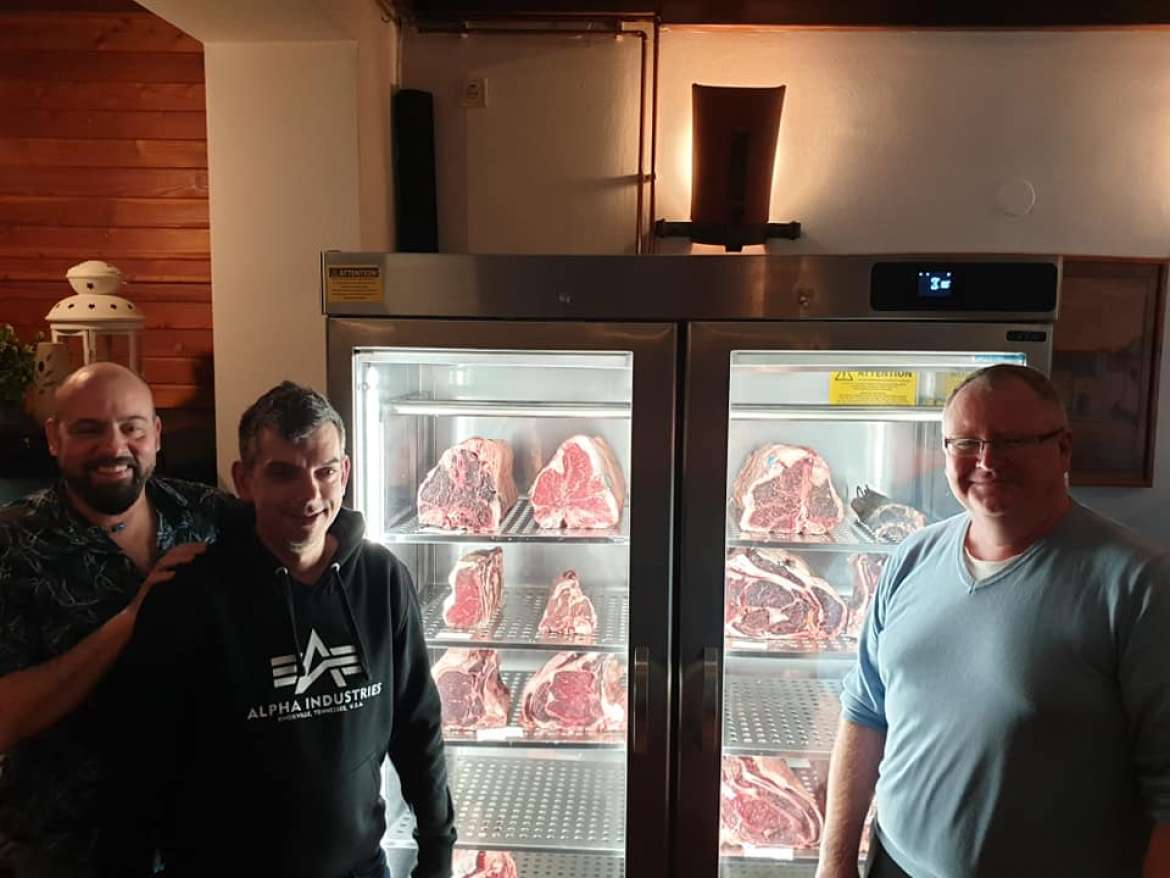
And again, we talked about that meat fest, which is looking ever more likely, as we reported yesterday that Nikola is not only retaining his staff but hiring more.
And the other thing I have noticed is that other people want to join in a discussion of hope and future happiness, and make all kinds of fantastic commitments.
Dear Ivo Spigel, for example, who is also keen to join the party, and he has seemingly agreed to pay for the whole lot. Young Spigel, I salute thee!
So there we have it. Sat in my bathrobe in Jelsa throwing out a couple of comments and posts on Facebook, I have managed to line up the most sensational day in the post-corona world.
Taking Mate Rimac for a spin in his C_2 to Varazdinske Toplice, before attending a quality tasting with Master of Wine, Jo Ahearne, in the company of two of Croatia's brainiest blokes, Igor Rudan and Marko Rakar, before an outstanding dinner prepared by Nikola Bozic and his team. And the joyous sight through the haze of wine bottles in various states of undress of Ivo Spigel picking up the bill..
What a place this post-corona world will be!
Until then, you can follow the latest from the coronavirus crisis in Croatia on the dedicated TCN section.
KBC Split Receives 6 Million Kuna in Cash Donations for Hospital Needs
April 5, 2020 - Over the last few days, Split-based KBC (Clinical Hospital Center) has received cash donations over HRK 6 million since the threat of COVID-19 in Croatia.
“Thanks a lot to everyone. People are donating for hospital needs, that is, for coronavirus purposes. All of them would like to buy ventilators, but since they are not currently available in the global market and are difficult to get, we are investing these donations into what we need to fight the coronavirus. A hospital committee was formed to control the spending of these funds. Various amounts are paid, ranging from small amounts to millions. And thank you to everyone, especially those of our citizens who took from their personal income or pensions,” says Dr. Julije Meštrović, Director of KBC Split for Slobodna Dalmacija.
Prior to this donation, only HRK 2.5 million had been spent for the construction work on Krizine to accommodate the special needs of patients infected with the coronavirus, and it is expected that approximately HRK 3 million will be spent.
However, despite the financial injections of various benefactors since the advent of the coronavirus infection, KBC Split has been closely monitoring developments in the world, and especially in Europe, to enter this war as readily as possible.
Since it was clear that the infection would affect all of Croatia, preparations for treatment began.
“The first and extensive infrastructure investments were made at the Clinic for Infectious Diseases at KBC Split in Krizine, where a new disinfection wing was built at the exit, direct exits to the terrace were opened in the patient rooms, and oxygen supply was installed throughout the hospital and sockets were installed for machine breathing,” notes Dr. Meštrović, who, by the decision of the Ministry of Health, was also named the coordinator for hospital treatment because of the pandemic.
In the next step, the entire Krizine hospital was transformed into a Respiratory-Intensive Center.
“By decision of the Ministry of Health, KBC Split was named one of four such centers for the treatment of COVID-19 in Croatia. KBC Split is the center for four southern counties of the Republic of Croatia. In order to agree and implement a new organization of work, the cooperation of the entire expert council, as well as of all the employees of KBC Split, was necessary. It has succeeded completely and all hospital staff has taken their duties seriously and they are disciplined,” says Dr. Meštrović.
The Križine Respiratory Center is organizationally prepared to receive and treat patients with the coronavirus infection.
“All patients from Krizine were transferred to Firule. Most elective procedures had to be canceled, just like controls. However, we regularly call patients by phone. In this way, they are supervised, they are advised on how to proceed, and in the event of deterioration, they are called for a review. Of course, all acute and oncology treatment services work as usual.”
Hospital staff is divided into teams. Some of the staff are on reserve so that they can fill the needs of the Respiratory Center and change teams at Firule every 7-14 days.
“The organization separated patients with suspected coronavirus infection, as well as those with respiratory tract inflammation from other patients, among whom are particularly sensitive groups of cancer patients and those with immune defects. This division minimizes the possibility of transmitting the infection among patient groups. Patients with suspected coronavirus infection go exclusively to Krizine, and patients with respiratory infections go to separate outpatients at the Pulmonary Disease Clinic and the Clinic for Pediatric Diseases,” Dr. Meštrović.
Initially, the diagnosis of the infection depended solely on testing in Zagreb, but today the testing capacities at KBC Split and the Public Health Institute (Hygienic) are large enough to test patients from the entire Split-Dalmatia County.
“The Krizine hospital is additionally renovated and equipped. Departments for the treatment of particular groups of patients have been designated, and the hospital has conditions for the most complex procedures, which include surgical procedures. The greatest burden of fighting the infection was borne by the staff of the Clinic for Infectious Diseases. However, the number of infected persons is increasing and an increasing number of patients are in other departments of the Respiratory Center. Therefore, all doctors and nurses of KBC Split are participating in the work of the Center, on a special schedule. Among patients, there are those in very serious clinical conditions; these are respiratory patients. There are currently seven in three counties in KBC and these patients are being cared for by anesthetists. The hospital has enough ventilators and other equipment to care for the most severely ill,” emphasizes the director of KBC Split.
KBC Split regularly cooperates with the Civil Protection Headquarters, the Teaching Institute for Public Health and the Health Center.
“The cooperation of county health and other services with KBC has achieved excellent coordination of work and success in reducing the spread of the infection, especially the occurrence of the most severe patients. Such a system could not function without the trust and cooperation of citizens and this cooperation is excellent,” concluded Dr. Julije Meštrović.
Follow TCN's live updates on the coronavirus crisis in Croatia
Drinking Non-Corona in the COVID-19 Age: Barba Craft Beer Comes to You
April 5, 2020 - So, what's it like running a craft beer company in Croatia during the corona era? TCN caught up with Barba from Split to find out more.
Life during the corona era is bad enough, but can you imagine life during the corona without pints? Never.
Thankfully, one Split craft beer company is ensuring no one in Croatia is thirsty during self-isolation. TCN caught up with Sinisa Andelic of LAB Split, the craft brewery behind the city’s famous beer brand - Barba.
By way of introduction for readers who may not have discovered the fabulous Barba range of craft beers yet, tell us a little about yourself and the company history.
We are small brewery based within the Split city limits. Since our opening almost 5 yrs ago, we have been at the forefront of the craft beer revolution and hopefully continue to create added value to our beautiful city.
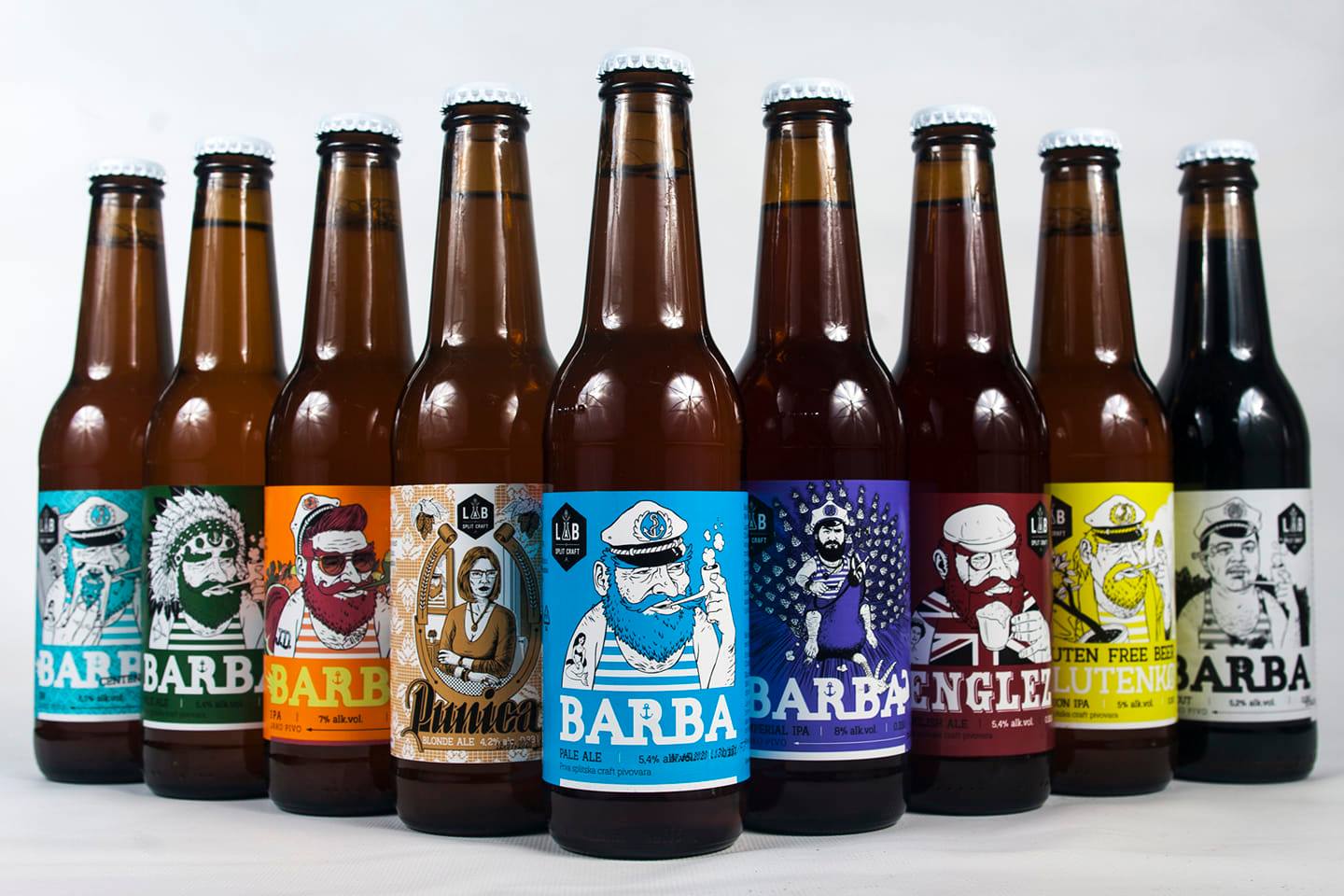
How were you doing pre-corona? How much of your business were online sales?
Actually, the situation with the corona was a bit of an eyeopener; we were forced to react overnight and do something to survive. We started taking orders via email and realized just how big and passionate our following is in Split. We went from about 5% online sales to almost 100% online self-delivered sales overnight. Bad situations such as this one sometimes bring positive things in the long run.
When did you realise corona was going to be a big thing?
I'm still working a morning job which is very multinational and global, so the concerns and problems were known to me from the very beginning, however, with the information overload that we are all used to, I hoped this wouldn't turn out to be so severe. We all are kind of used to reading about disastrous apocalyptic things that could happen any second, and then they pass by and do not affect our lives in any way. I believe this was a major problem that led to some countries taking this virus too lightly.
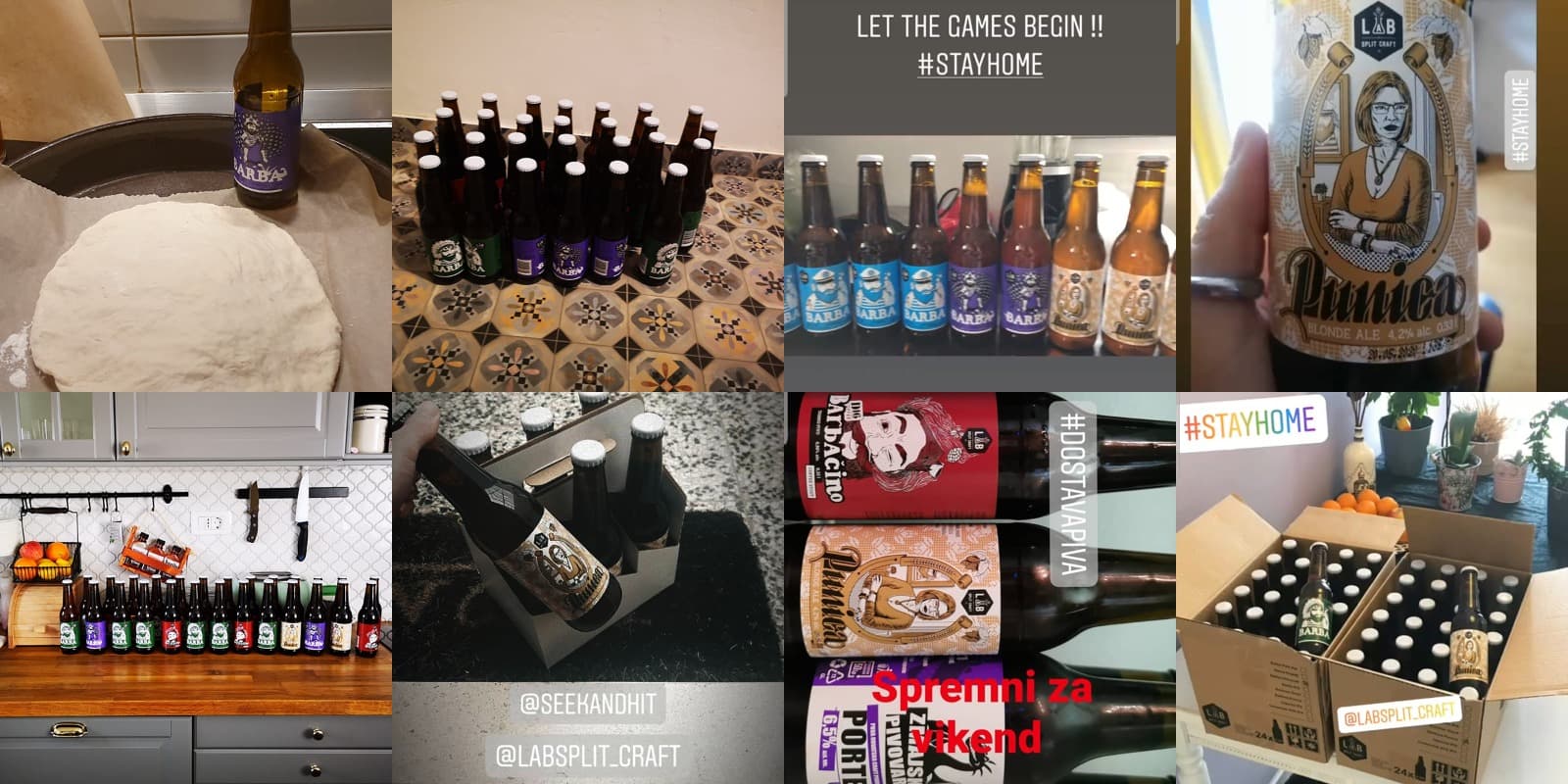
Give us a timeline and story of how it damaged your business
It all went from 0 to 100 in less than 2 seconds. Overnight all our customers closed as precaution measure and then only silence occurred. Don't get me wrong, this was a very responsible decision to make and we fully support it. However, our business stopped as well, and we just had to do something.
People still need beer, perhaps now more than ever. Tell us how you reorganised, and what services you are offering now.
We started by taking orders from people via email. More and more people started calling and ordering, things began to be hard to follow, so to avoid confusion and people being left without beer, we streamlined our orders and organized a webshop in a matter of days.
How much more challenging is the production with the restrictions?
Nothing and everything changed; the main problem is that we are fighting an invisible enemy and you never know if you did enough to protect your workers and their families. We are maybe more used to hygiene and cleaning processes than others since beer production is very germ sensitive and our SOPs are very strict.
And arranging deliveries?
We are doing contactless deliveries; payment is only received via e-banking and boxes of beer are left on your doorstep usually the next day once the payment is visible in the system. Safe and quick. You can check out our webshop to see what's on offer.
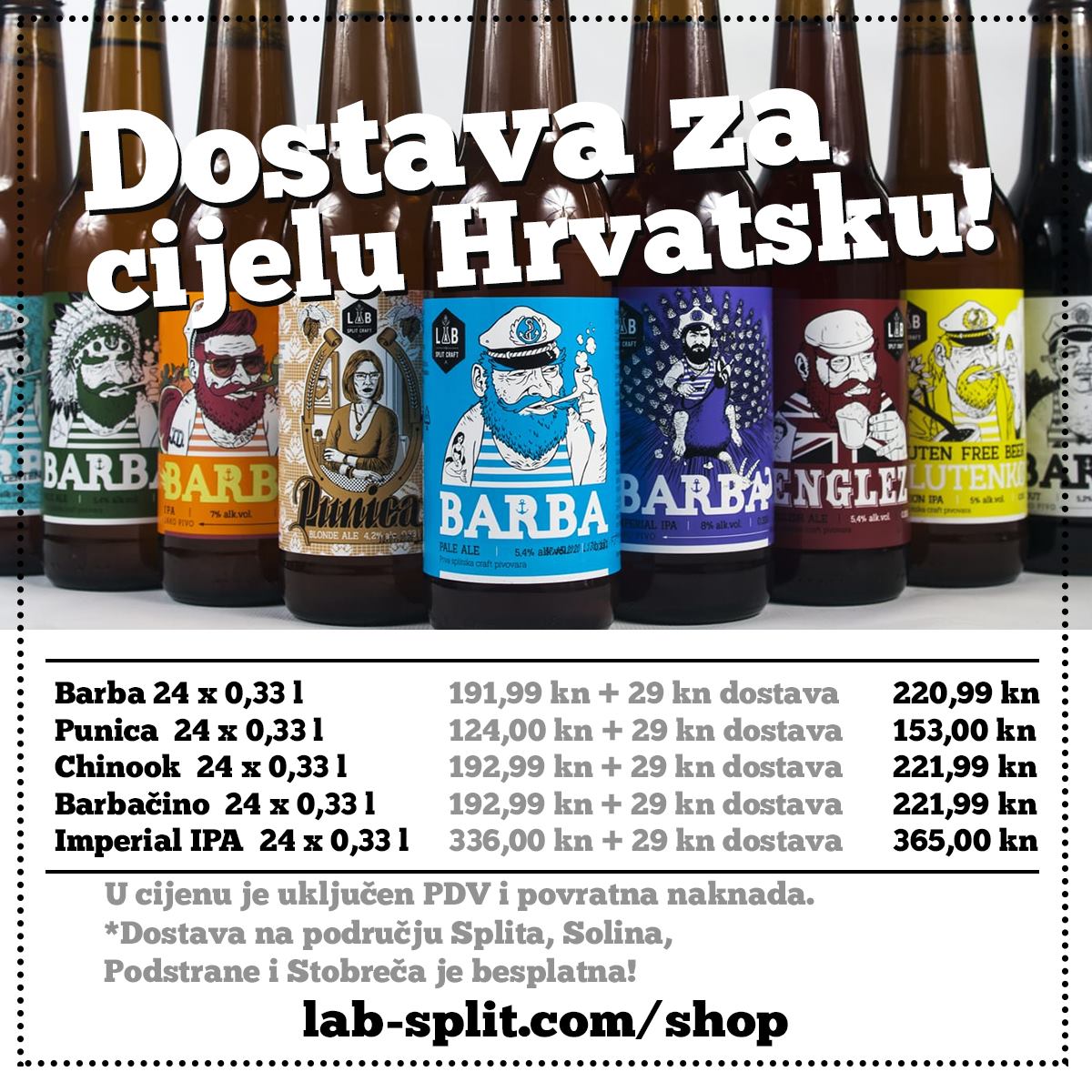
Any thoughts on a special-edition #StayHome corona survivor brew?
This I cannot stress enough. A big THANKS to our customers and brewery friends that started working overtime to help us, helped spread the word, and helped us regain at least part of sales. We initially reacted by lowering prices thus making our beers really good value for money. For instance, we discounted Punica (mother-in-law in Croatian) Blond Ale that we now sell for 5.15 kuna per bottle!! And we are almost out of Punica in only two weeks.
We are still working on a few ideas on how to repay these wonderful people and show how much this means to us! Maybe a special beer, maybe an event once this is over... let's call it a work in progress for now!
Sales of the beer Corona fell 38% in the States due to the name association. Do you think you would have survived if COVID-19 had been called the Barbavirus?
I'm afraid even to think of that scenario. Let's keep it at that.
To read more about lifestyle in Croatia, follow TCN's dedicated page.

